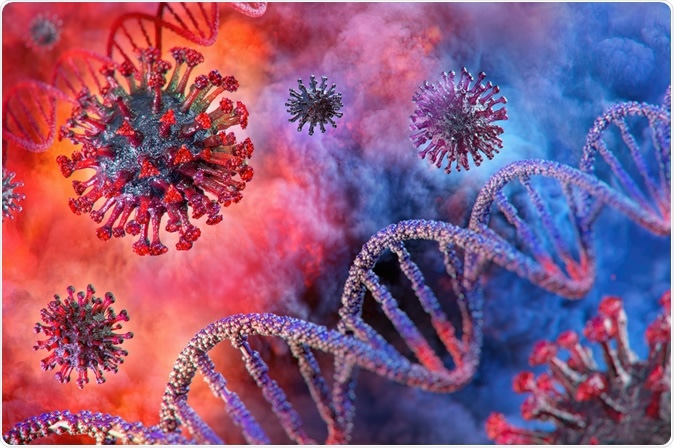The coronavirus disease (COVID-19) outbreak has sparked fear and panic since it started to spread in late December 2019. Now, the number of infections has topped over 80,000, with more than 2,699 deaths reported in just two months. Though the number of cases dwindled in mainland China, this is not the case in other parts of the world.
Iran and Italy have reported a sharp rise in the number of infected people, with the death toll steadily increasing. Italy has a total of 229 cases, with seven deaths.
Iran reports 61 cases, but the death toll is high, with 12 deaths reported in just a couple of days.

Coronavirus disease COVID-19 infection 3D medical illustration. Image Credit: Shutterstock
Iran cover-up?
The Iranian government has denied trying to cover up the full extent of the coronavirus outbreak in the country. The country’s deputy health minister had denied the claim of a cover-up, but a parliamentarian for Qom, the epicenter of the outbreak in Iran, accused officials of lying about how severe the outbreak in the nation is.
Ahman Amirabadi-Fatahani reports that there had already been 50 deaths in Qom alone.
Authorities denied the allegation and insisted that they would be transparent about reporting deaths linked to the COVID-19 outbreak.
Meanwhile, in the Middle East, other countries have reported their first coronavirus cases, all involving individuals who came from Iran, including Afghanistan, Iraq, Kuwait, and Bahrain.
Italy facing a major outbreak
In Italy, the case toll has increased to 229, up from just 155 in 24 hours. The epicenter of the coronavirus outbreak in northern Italy has been locked down, with restrictions imposed particularly on Lombardy and Veneto.
While Italy has reported most of the cases in the two regions, there were additional cases in Lazio, Emilia-Romagna, and Piedmont.
Amid the sudden spike of cases, the World Health Organization and the European Center for Disease Prevention and Control assisted local authorities in the area. To prevent the spread of the virus, authorities have closed major tourist attractions, suspended classes, and postponed private meetings. Officials urged residents in the affected areas to stay indoors and avoid contact with other people.
Further, transport restrictions were imposed, and residents are barred from leaving the region without special permission. Precautionary measures to contain the virus include active surveillance and quarantine of potential close contacts of confirmed cases.
Currently, officials admit that they still do not know where the coronavirus started in Italy, making it hard to stem the outbreak. To contain the spread of the virus, the locked-down 12 towns, prompting residents to stockpile food.
Major streets, markets, shopping centers, and parks look deserted in the affected regions. Authorities and health officials urge for calm. Crowding supermarkets and grocery stores make the risk of contracting the virus higher. Instead of dashing to supermarkets to buy food, it would be better to look after the most vulnerable people who are at the highest risk, according to Beppe Sala, Milan’s mayor.
How to protect yourself
The World Health Organization (WHO) reminds everyone to stay cautious and vigilant as the cases of the novel coronavirus increases in other parts of the world. Though the number of cases has declined steadily in China, other countries have reported new cases.
It is vital to protect oneself from contracting the infection by limiting human-to-human transmission—the WHO encourages everyone to wash hands regularly with soap and water. If there is no access to soap and water, use an alcohol-based sanitizer. Further, everyone should practice social distancing, by maintaining a 1 meter or 3 feet distance from others, especially those who are sick.
When you are sick, stay indoors and avoid contact with other people. Practice respiratory hygiene by sneezing or coughing on a piece of tissue and discard it immediately after. After touching common surfaces, such as doorknobs, grocery cars, telephones, and elevator buttons, among others, wash your hands immediately and refrain from touching your eyes, nose, and mouth.
For people with close contact with infected people, and those who have a travel history to coronavirus-stricken areas, seek medical attention right away if symptoms emerge.